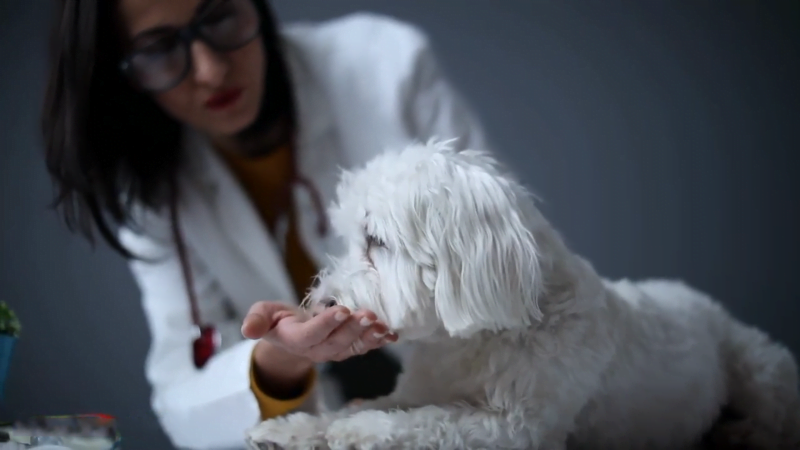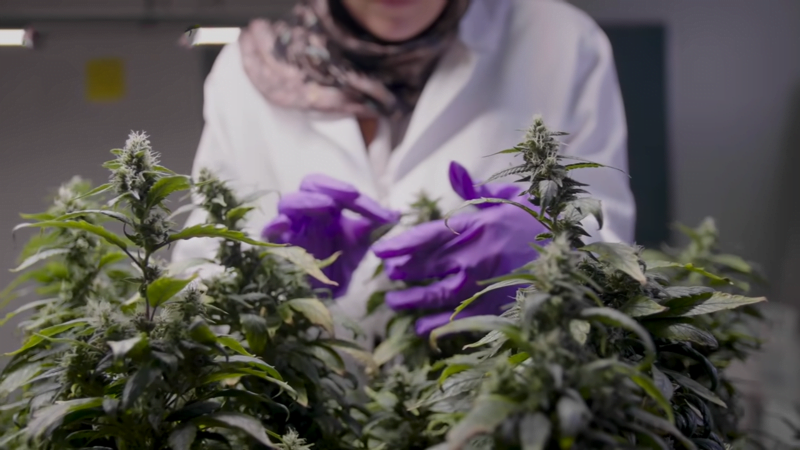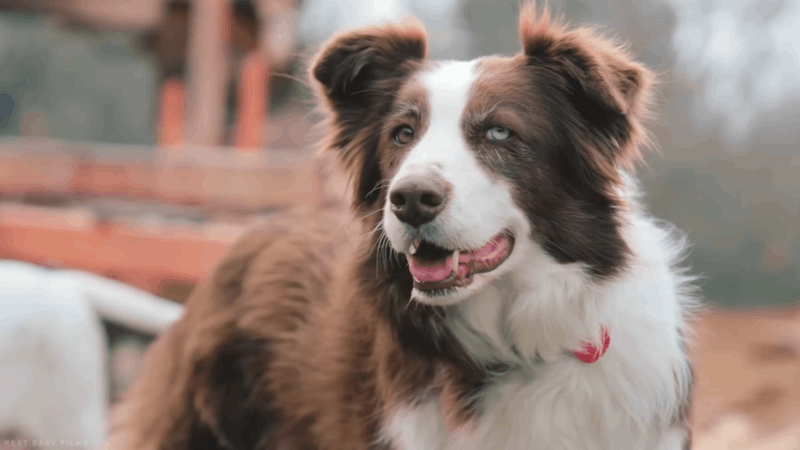No products in the cart.
A common question among pet owners seeking to harness the potential benefits of CBD for their furry companions is, how long does CBD take for dogs to show effects? Understanding the duration of CBD’s presence in a dog’s body is crucial for optimizing its effects and ensuring safe usage.
In this blog, we delve into the factors that influence how long CBD remains in a dog’s system and explore its implications for dosing, effectiveness, and overall well-being.
How Long Does CBD Take for Dogs?

The dog’s size, metabolism rate, and the specific dosage administered are the factors that can affect the length of time that CBD remains in a dog’s system. The benefits of CBD dog health can usually be felt for a few hours after consumption, however, the compound may still be present in small amounts in the body for several days or longer.
Given these variables, it’s crucial to take them into account when incorporating CBD into a dog’s regimen. To ensure the best approach, seek guidance from a veterinarian, who can provide personalized recommendations on dosage, timing, and monitoring.
Different Levels of CBD Potency for Dogs
CBD potency levels for dogs vary based on the specific product and its intended use. Here’s an overview of the different levels of CBD potency commonly available for dogs:
- Low potency: Low-potency CBD products for dogs generally contain around 5mg to 10mg of CBD per serving. These are often recommended for small dog breeds or for general wellness support.
- Moderate potency: Moderate-potency CBD products typically contain around 10mg to 20mg of CBD per serving. These can be suitable for medium-sized dogs and may be used to address mild to moderate issues like anxiety or minor discomfort.
- High potency: High-potency CBD products for dogs have concentrations of around 20mg to 30mg of CBD per serving or even higher. These are often chosen for larger dogs or for managing more significant health concerns like chronic pain or severe anxiety.
- Extra high potency: Some CBD products designed for specific therapeutic purposes may have extra high potency levels, exceeding 30mg of CBD per serving. These are used for specific cases and should be administered under veterinary guidance.
When selecting a CBD product for your dog, consider their size, the specific health concern you’re addressing, and any recommendations from your veterinarian. Start with a lower potency and gradually increase if needed, closely monitoring your dog’s response. It’s essential to prioritize your dog’s safety and well-being by consulting a veterinarian before introducing any new CBD product into their routine.
Factors that Affect How Long does CBD Stay in Dogs System
The duration it takes for CBD to stay in dogs system varies due to several factors that influence its absorption and onset of action. These factors include:
Administration method: The method you use to administer CBD (e.g., oil, treats, capsules) affects how quickly it enters the bloodstream and consequently how long it takes to work.
- Dosage and potency: Higher doses or more potent CBD products might lead to faster effects, but the duration of those effects can also be influenced.
- Body weight and size: Larger dogs might experience quicker effects due to their larger body mass and potential faster metabolism.
- Metabolism rate: Dogs with faster metabolisms generally process CBD more quickly, resulting in faster onset.
- Individual variation: Just like in humans, individual dogs can react differently to CBD, with some experiencing faster effects than others.
- Overall health: Dogs with certain health conditions might have altered digestion and absorption rates, affecting CBD’s timing.
- Digestive state: Whether your dog has recently eaten can impact how quickly CBD is absorbed into the bloodstream.
- Age: Younger dogs might experience quicker effects due to their generally higher metabolism rates.
- Endocannabinoid system sensitivity: Dogs with a more sensitive endocannabinoid system might respond faster to CBD.
- Regular usage: With consistent usage over time, some effects of CBD might build up in the dog’s system.
- CBD product type: Different types of CBD products (full-spectrum, broad-spectrum and CBD isolates for dogs) might have varying rates of absorption and effectiveness.
- Underlying condition: The specific ailment you’re addressing with CBD might impact how quickly your dog experiences relief.
Understanding these factors can help you set appropriate expectations when administering CBD to your dog. Start with a lower dosage and monitor your dog’s response, gradually adjusting as needed under veterinary guidance. Ask your veterinarian for specific advice if you have concerns with the use of CBD for your dog or its timing.
How Frequently Should You Give Your Dog CBD?

The frequency of administering CBD to your dog depends on various factors, including their size, the specific condition you’re addressing, and the product’s potency. As a general guideline, many pet owners start with once or twice daily and monitor their dog’s response.
Regularity is key, so maintaining a consistent schedule allows for a more effective and predictable outcome. Consulting your veterinarian is essential to determine the appropriate dosage and frequency tailored to your dog’s individual needs.
Is There a Difference in the Way CBD Affects Different Breeds of Dogs?

Yes, there can be differences in how CBD affects different breeds of dogs. Just as individual humans can respond differently to medications, dogs of different breeds may have varying reactions to CBD due to factors like genetics, metabolism, and overall health. Here are some points to consider:
- Metabolism: Different breeds have different metabolic rates, which can influence how quickly CBD is processed and its effects are felt.
- Sensitivity: Some breeds might be more sensitive to CBD’s effects, experiencing a stronger response with lower doses.
- Endocannabinoid system: The endocannabinoid system of every breed can result in variations in how they respond to CBD.
- Size and weight: Larger breeds might require higher doses to achieve the same effects as smaller breeds.
- Specific health conditions: CThe effects of CBD on the health issues that some breeds are predisposed to can differ.
- Activity levels: Breeds with different activity levels might respond differently to CBD, especially in terms of pain relief or relaxation.
- Anxiety levels: Some breeds are naturally more anxious, and calming effects of CBD for dogs might be more pronounced in these cases.
It’s important to approach CBD use with an understanding of your dog’s breed-specific characteristics and potential sensitivities. Consult your veterinarian before introducing CBD to your dog’s regimen, especially if they have any underlying health conditions or are on other medications. Starting with a lower dose and monitoring their response is a prudent approach, regardless of the breed.
What Happens When CBD Comes in Contact with Your Dog’s Body?
When CBD comes in contact with your dog’s body, it interacts with their endocannabinoid system (ECS), a complex regulatory system present in mammals, including dogs. Here’s what happens when CBD interacts with your dog’s ECS:
- Activation of cannabinoid receptors: CBD interacts with cannabinoid receptors (CB1 and CB2) located throughout the ECS. CB1 receptors are mainly found in the brain and nervous system, while CB2 receptors are more prevalent in immune cells and peripheral tissues.
- Modulation of neurotransmitters: NCBD’s interaction with CB1 receptors in the brain can influence the release of neurotransmitters, helping to regulate mood, stress, and anxiety.
- Anti-inflammatory effects: CBD’s interaction with CB2 receptors can contribute to reducing inflammation in various tissues and organs.
- Pain management: CBD may help with pain reduction by altering how pain signals are perceived by interacting with both CB1 and CB2 receptors.
- Homeostasis regulation: The ECS helps maintain balance in the body’s various systems. CBD’s interaction with the ECS supports this homeostatic regulation.
- Potential for anxiety reduction: CBD’s impact on neurotransmitters like serotonin can contribute to a calming effect, potentially reducing anxiety and stress in dogs.
- Possible anti-seizure effects: In some cases, CBD’s interaction with the ECS may help reduce the frequency and severity of seizures.
- Support for overall wellness: CBD’s interaction with the ECS can promote overall well-being by addressing various physiological processes.
It’s important to note that individual responses can vary and to understand the specifics of CBD’s effects on dogs, more research is necessary. Consulting your veterinarian before introducing CBD to your dog’s routine is essential to ensure safe and appropriate usage. Additionally, starting with a lower dose and gradually increasing it while monitoring your dog’s response can help you find the right balance for their needs.
Are There Any Long-Term Effects of Giving CBD to a Dog?
CBD is generally considered safe for dogs, however, there are a few considerations to keep in mind:
- Lack of long-term studies: The lack of long-term studies means that potential effects over extended periods are not well understood.
- Liver enzyme interaction: Some studies have shown that CBD can interact with liver enzymes, which could have implications for long-term use, especially in dogs with liver conditions or those on other medications.
- Tolerance and efficacy: There’s a possibility that over time, a dog’s body might develop a tolerance to CBD’s effects, potentially requiring adjustments in dosage.
- Overall health: CBD’s impact on a dog’s overall health with prolonged use is still being investigated.
To mitigate potential risks and ensure the best outcomes, consider these steps:
- Consult a veterinarian: Prior to using CBD for your dog, consult with your veterinarian. They can provide guidance tailored to your dog’s individual needs and health status.
- Regular check-ups: If using CBD long-term, schedule regular check-ups with your vet to monitor your dog’s health and assess the ongoing effectiveness of the CBD.
- Quality products: Choose high-quality CBD products from reputable manufacturers that undergo third-party testing to ensure potency and purity.
- Start low and go slow: Begin with a low dosage and gradually increase it if needed, while closely observing your dog’s response.
- Monitor for changes: Keep an eye out for any changes in behavior, appetite, or overall well-being that could indicate a need for dosage adjustment or discontinuation.
It cannot be denied that CBD brings many potential benefits for certain conditions, however, it’s important to proceed with caution. Work closely with your veterinarian to make informed decisions about integrating CBD into your dog’s health regimen.
If you’re seeking a trustworthy destination for purchasing CBD products for your beloved pets, look no further than Pet CBD Club. It is a preferred choice among numerous customers who rely on and benefit from a range of pet-friendly CBD offerings.
CBD Products for Dogs: Which Has a Longer Duration CBD Effects on Dogs?

The type of CBD product used can influence the duration of CBD effects on dogs. Here’s a comparison of different CBD products in terms of their potential duration of effects on dogs:
| CBD Product | Duration of Effects | Reasoning |
| CBD Edibles (Treats, Chews) | 4 to 8 hours | Digestion process delays onset and effects. |
| CBD Oil/Tinctures (Oral) | 4 to 6 hours | Sublingual administration for faster absorption. |
| CBD Capsules/Pills | 6 to 8 hours | Digestion required before full absorption. |
| CBD Topicals | 2 to 4 hours | Localized application with limited bloodstream absorption. |
| CBD Isolate vs. Full-Spectrum | Potentially longer-lasting effects with full-spectrum due to the entourage effect. | Various compounds in full-spectrum products may extend effects. |
It’s important to note that individual responses can vary based on factors such as the dog’s metabolism, health condition, and the specific CBD product used. Additionally, the duration of effects might not correlate directly with the duration of CBD’s presence in the dog’s system, which could be longer.
Consider your dogs’ specific needs and preferences and get advice from your veterinarian for guidance on dosage and timing if you want to select a CBD product to use for your pet.
Conclusion
The question “How long does CBD take for dogs?” holds significant importance for pet owners seeking to harness the benefits of CBD for their furry companions. The duration of CBD’s effects can vary based on factors such as administration method, dosage, and individual metabolism. It’s crucial to approach CBD use with careful consideration, consulting a veterinarian for personalized guidance.
Hello, I am Hazel Bennett, an experienced copywriter specializing in the fascinating topic of CBD for dogs. With a passion for pet wellness and extensive knowledge of CBD’s potential benefits, I am here to provide you with informative and engaging content.



